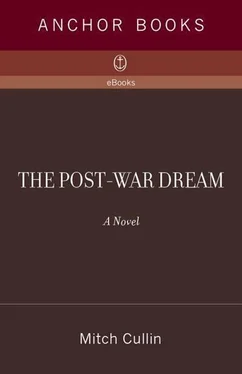The listening post was now visible — some twenty yards away, much closer than Hollis had estimated — and McCreedy had emerged past its sandbags and dirt, M1 in hand, scrutinizing the area while half circling the dying pine tree, putting the grayish trunk between his body and the Naktong, shielding himself there. Upon leaning the rifle against the tree, McCreedy undid his pants, tugging his penis out through the fly, and, as the sun angled a ray within inches of his boots, started urinating on the ground, exposing himself in the way he had once warned Schubert never to do (yet he was nothing if not cavalier regarding his own safety, unflinching in the belief that the pennies in his pockets would keep him secure). When finished, he didn't fasten his pants, but instead left his dribbling penis open to view while fishing a cigarette from a pocket, eyes darting here and there, careful not to let his guard lapse and, perhaps, also searching for the whereabouts of Hollis. Behind him sunlight crept along the river, stunning the banks.
Then with McCreedy's exhalation of smoke, the previous evening's anger and humiliation stirred inside Hollis like bile. No damn good, he thought. Worthless. Lifting the semiautomatic, easing the barrel through the reeds, he fixed the sights — the smoldering cigarette, the head in profile, the muscular neck — taking careful aim: McCreedy's right hand slid into his fly, bringing his penis with it, doing so while lowering himself, back pressed against the tree, legs set akimbo; puffing on the cigarette, the heedful gaze now cast toward the crotch of his uniform, McCreedy's right hand squirmed around within the pants, making a wrenching motion which bulged and gyrated beneath the fabric. Hollis, too, suddenly felt an unexpected charge of arousal mixing incongruously with his desire for revenge, the extreme sensation becoming heightened with the spasmodic jolting of McCreedy's boots, the acceleration of motion underneath the uniform — even while he steadied the rifle, finding McCreedy weaker and more assailable than he had ever seen him previously. You'd never know what hit you, he told himself. You'd be gone like that.
And as if it had been impelled from his own mind, a single shot burst forward, terminating the morning calm and stunning the hearing in Hollis's left ear; then, simultaneously, down the length of the rifle he saw McCreedy transfigured into the autonomous, undeniable world of the dead: the round struck him at the neck, ripping apart a jugular vein — splitting bark after passing through him, cracking the trunk of the pine tree — and briefly jettisoned blood up and out like a geyser, giving the illusion of McCreedy's head having just exploded, accompanied by a fine red mist which shimmered for a moment in the air before dissipating into the cascading sunlight. With his head violently jerked to one side and the neck partially severed, the weight of McCreedy's helmet pulled him over, slumping his left shoulder and torso to the ground, raising his bent right knee a few inches — his hand now motionless inside his blood-soaked pants, his boots no longer twitching with pleasure.
Indistinct voices began yelling from the apple orchard. A whistle blew on a hillside. Serves you right, Hollis might have thought, had McCreedy's impromptu demise not confounded him so, robbing his breath, making him senseless. You weren't really that special, you had it coming. But his finger hadn't been at the trigger; he hadn't fired, nor had he truly planned on vengeance: he simply wanted his cigarettes returned. In his left temple, a pulse started pounding against his brain. “In God we trust,” he whispered with the lowest of sound, regaining himself, apprehending then that the lethal shot had been discharged within feet of where he was hiding: “time flies, rest in peace, peace be with you, peace on earth.” Someone tore through the overgrowth several meters behind him, a hunched figure obscured by reeds and bolting for the shore. “Good will toward men, one for all and all for one — ”
What happened immediately thereafter would forever exist in Hollis's memory as a mostly bleared, unfocused event, meshed with sparse flashes of clarity. Without thinking twice, he scrambled from the reeds, uttering words which didn't reach the air, and, McCreedy's tilted corpse burned like an after-image, rushed along the bank, chasing a small figure in a mustard-drab uniform. His boots twisted in sand, across rocks and stones — that much he remembered — yet he couldn't recall if he had fired first, knocking the North Korean soldier to the sand, or if, in fact, the boy had tripped and, with Hollis drawing near, the M1 poised, rolled over, squeezing off a haphazard shot which still hit its intended target. Regardless, they had quickly exchanged fire, striking each other at close range: five rounds from the semiautomatic M1, a single round from a Japanese-made bolt-action rifle. And then, in what had seemed like the fleeting passage of mere seconds, it was all finished; the war had concluded for him, McCreedy, and a young North Korean whose name or short-lived history he would never know.
Subsequently, Hollis scoffed while watching cowboy movies or TV police dramas, frowning whenever a character was struck by a bullet and seized their chest, staggering dramatically, grimacing, and, all of the sudden, collapsing. His personal understanding of being shot was quite different; for he had remained standing on the bank, staring at the dying sniper who lay faceup at his feet, the Japanese-made rifle cast aside. Where did you come from? he wondered. Why didn't I hear you any earlier, or you me? The boy gasped like a stranded fish trying to breathe and oozed red foam between quivering lips and then, producing a slight gurgling noise, stopped living: the brown eyes reflected the sky; the face was round, smooth, hairless; although stained with blood, the mouth and chin were untouched; the coarse black hair was groomed, cropped short; there was a mole on the right cheek, a mole on the left earlobe; the hands were slender, the fingers long and unadorned, the fingernails dirty; the torso was a mess, the uniform oily and glistening with sanguine fluid — the five shots having struck millimeters apart, punching a fist-size hole in the narrow chest; the boy appeared younger than twenty, older than fifteen.
Fueled by adrenaline and panting hard, Hollis glanced at the Japanese rifle and noticed his left leg, saw the blood cascading from a massive gash in his fatigues, wetting everything below his knee. “Son of a bitch,” he said, his voice less enraged than irritated. “Goddamnit.” Like a waterfall, he thought. Like a crimson waterfall, pooling in the sand around his boot. But he didn't stagger about on the bank or use a hand to cover his injury, nor did he panic or feel anything other than numbness; instead, he promptly used the rifle like a crutch, pushing its butt into the ground and gripping its barrel for support as he sat himself in front of the boy, extending his sodden leg outward, waiting to be helped. Presently, he lay down on the sand, filling his view with a pure expanse of blue ether, and all at once his body grew perceptibly lighter — a point of fraction, as if an unknowable part of himself had risen up, escaping the riverside, choosing to stay in Korea even while the rest of him was bound to be rescued.
With his consciousness now ebbing, he heard a burst of machine-gun fire from the apple orchard and a single explosion somewhere else, perhaps across the river. He had the impression that major combat was resuming, although he didn't trust his ears anymore. “In God we trust,” he began again, “times flies,” but was unable to continue. Later, when he reflected on it, the conclusion of the incident seemed anticlimactic to him, because he was strangely at peace, somewhat relieved; the resentment and anger he had harbored toward McCreedy had been eradicated — and rather than transfer those emotions to the boy, it was an odd kind of gratitude he experienced instead, especially since he had survived circumstances which should have easily killed him. Then just as a wounded animal or insect might die quietly in its own environment, so had the boy. But Hollis had never belonged there, and, as such, he wouldn't allow himself to expire beside the Naktong; he wouldn't rot on the shore or get sent floating downstream: two lives may have been claimed at dawn, yet his life was about to begin anew; that was how he felt. Conceiving this to be his outcome, he closed his eyes. He heard the sound of multiple footsteps approaching, pounding the rocks and pebbles and sand — and, he knew, they were coming to save him, to carry him away from the river and, hopefully, ship him home alive.
Читать дальше










![Theresa Cheung - The Dream Dictionary from A to Z [Revised edition] - The Ultimate A–Z to Interpret the Secrets of Your Dreams](/books/692092/theresa-cheung-the-dream-dictionary-from-a-to-z-r-thumb.webp)

